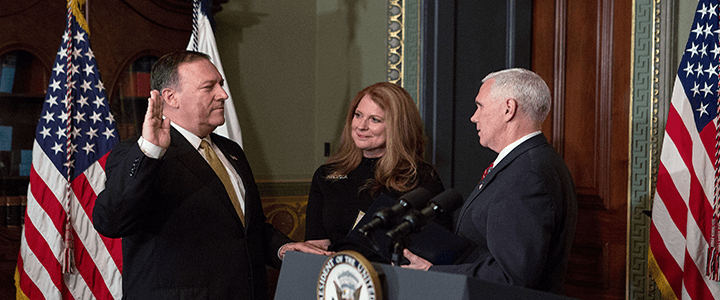When he appeared before the Senate Foreign Relations Committee last week for the confirmation hearing on his nomination to be secretary of state, CIA Director Mike Pompeo was not asked the question that former Sen. Carl Levin used to ask nominees that appeared before his committee: have you undertaken any duties that presume the outcome of your confirmation? Had he been asked, he might have had a hard time answering truthfully.
We now know that over Easter weekend, President Trump dispatched Pompeo to Pyongyang, where he met with North Korean leader Kim Jong-un to begin to lay the groundwork for a U.S.-DPRK summit later this spring. Trump confirmed the meeting via Twitter during his meetings with Japanese Prime minister Shinzo Abe at the Mar-a-Lago resort in Florida.
While the president is certainly free to send whatever government official he wants to negotiate with a foreign leader, meetings of this importance are usually the domain of the secretary of state. John J. Sullivan, the deputy secretary of state, is currently the acting secretary, but Trump chose his intel chief and chosen successor to Rex Tillerson to make the secretive trip to the Hermit Kingdom.
But it is entirely appropriate that Trump would send Pompeo.
the cia’s north korean back channels
Sending the CIA director makes sense. Pompeo and his team at Langley have reportedly been maintaining contact with their North Korean counterparts for a while. Sen. Bob Corker (R-Tenn.), chairman of the Senate Foreign Relations Committee confirmed as much Wednesday morning. “It’s perfectly natural, then, that he would be the person to have the first meeting and sit-down,” Corker told reporters.
These sort of “back channels,” out of sight of the public and even most of the bureaucracy, serve a vital role. The U.S. has never had formal diplomatic relations with North Korea, so any lines of communication are a good thing. The CIA’s ongoing engagement not only established such a line of communication, it meant that Pompeo could make the trip as the CIA chief, and not as the presumptive secretary of state, to lay the groundwork for the future summit.
Whatever was said in the meeting, it seems to have impressed Pompeo. Because when he returned, he was advocating a very different approach to North Korea than he had done in the past.
regime change and eliminating the nuclear threat
I’ve expressed my skepticism with North Korea’s overtures before. Kim’s reversal, from his position in January that his country’s nuclear arsenal was “a powerful and reliable war deterrent, which no force and nothing can reverse,” to his present position that the denuclearization of the Korean Peninsula is open for discussion, is nothing short of incredible. But Kim isn’t the only one whose mind has changed.
At the Aspen Security Forum last July, Pompeo said, “the thing that is most dangerous about [Korea] is the character who holds the control over [its nuclear weapons] today.” At the time, that was interpreted as an indication that Pompeo himself, if not the administration, favored regime change in the North.
Not so last week. At his hearing, Democratic Sen. Ben Cardin of Maryland pressed Pompeo on those remarks. Pompeo blinked. “I have never advocated for regime change,” he replied. “I am not advocating for regime change.”
While regime change would be in the best interest of the oppressed people of the Democratic People’s Republic, eliminating the country’s nuclear threat is the most pressing issue from the U.S. perspective—as well as that of our allies Japan and South Korea. Since staying in power is Kim’s first priority, backing off the regime change requirement is a sound strategy.
If Kim thinks he’ll be able to negotiate a deal where he can give up his nukes in exchange for a lasting peace that preserves the status quo, then the U.S. strategic goal will have been met. Everything else is a bonus.




